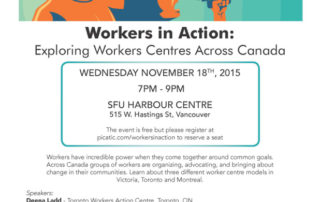Workers’ Rights Law Reform
Our Workers’ Right Law Reform work is focused on creating an accessible worker’s compensation system for injured workers and ensuring that laws that govern the province’s compensation system is up-to-date and is inclusive of mental health injuries and illnesses.
Equality for Injured Workers with Mental Illness
Work is changing. And so is our understanding of the risks. When BC’s workers’ compensation system was created over 100 years ago, it focused almost entirely on physical injuries. But today we know that there are risks to workers’ mental health that are just as significant. Whether it’s a first responder witnessing a traumatic accident scene, a social worker dealing with clients in crises, or someone experiencing bullying and harassment in the workplace, the risks are very real.
Yet the workers’ compensation system continues to impose additional barriers on people claiming for work-related mental conditions that are not imposed on other workers. For example, WCB can deny a claim if they feel the stress the worker experienced is just part of the job or if the source of the stress is a decision by the worker’s boss. WCB can also deny the claim if the worker’s condition has not been fully diagnosed or if they think other factors in the worker’s life contributed more to the mental injury. None of these hurdles are imposed on workers with physical injuries.
We believe it’s time to end discrimination against workers with mental illness by changing the law to ensure that they have equal access to WCB benefits.
Navigating the WCB Maze
A key purpose of the worker’s compensation system is to get injured workers compensation quickly and simply. Yet for many workers, the system is anything but quick and simple. Too many workers are losing benefits they rightly deserve because they do the wrong thing in the wrong place at the wrong time. Other workers cannot even get a final decision about their claim because the maze just keeps sending them around in circles.
We believes the focus should be the merits and justice of the worker’s claim, and not technicalities. When the system fails the worker or keeps sending them around in endless circles, we will continue to ask courts to intervene to ensure the worker can access justice.
Colwill v. Workers’ Compensation Board, 2019 BCSC 826
This case challenged the WCB’s policies that restrict who can get the minimum benefit in the Workers’ Compensation Act for very poor workers who are left permanently and totally disabled. The Court found that the WCB’s policies limiting who can get this minimum benefit were illegal. Rather than sending the worker back into the convoluted and never-ending WCB policy review system, the Court cut to the chase and just struck the policies down.
Denton v. Workers’ Compensation Appeal Tribunal, 2017 BCCA 403
The worker was denied compensation for her work-related mental disorder because WCB found that the stress she experienced was just part of her job. WCB also found that the unhealthy overtime she was working was the result of her employer’s decision to restructure, which meant she could not get coverage. The worker challenged these restrictions to compensation for workers with mental disorders, saying they violated the equality rights of people with mental disabilities under the Charter. The BC Supreme Court found her case had no chance of succeeding because she had raised her challenge in the wrong place at the wrong time. On appeal, CLAS intervened with West Coast LEAF to explain how hard it is for workers to navigate the complicated WCB appeal system. Courts therefore have an obligation to make sure that workers can access justice and that workers do not lose their rights just because of difficulties understanding the WCB appeal system. Unfortunately, the Court dismissed the worker’s appeal after finding that she should have raised her Charter challenge earlier. This case highlights the ongoing need for law reform to simplify the WCB appeal system.
Goik v. Workers’ Compensation Appeal Tribunal
The worker had a double lung transplant after he was exposed to silica dust in the workplace. The doctor who did the double lung transplant said it was necessary because the worker had silicosis. Yet someone the WCB decided that he was not entitled to compensation. The Court reviewed the case and found that the decision to deny him compensation was clearly unreasonably.
Chmielewski v. Workers Compensation Appeal Tribunal, 2017 BCSC 1756
The worker fractured his face and jaw when he fell while working in a construction camp in northern British Columbia. When a worker has an accident in the course of their employment, it is presumed that the accident is covered by the workers’ compensation system. Yet the WCB denied the worker’s claim without properly applying this presumption. The Court reviewed the case and quashed the decision finding that the accident was not covered by the workers’ compensation system.
Marchant v.Workers’ Compensation Appeal Tribunal, 2014 BCSC 1194
The worker’s job required him to work on his knees for long periods of time.He eventually developed arthritis in his knees. The worker’s doctors confirmed that kneeling for long periods of time can cause arthritis. Yet the WCB decided that there was no evidence that kneeling for long periods of time could cause arthritis and denied his claim. The Court reviewed the case and found that the decision denying the worker’s claim was clearly unreasonable.
Jozipovic v. British Columbia (Workers’ Compensation Board), 2012 BCCA 174
CLAS successfully challenged WCAT’s policy with respect to the application of the “loss of earnings” method of calculating benefits.
Honda Canada Inc. v. Keays, 2008 SCC 39
CLAS intervened on behalf of the Council of Canadians with Disabilities to argue that human rights protections are an implied term of every employment contract.
Kovach v. British Columbia (Workers’ Compensation Board), 2000 SCC 3
CLAS successfully argued on behalf of injured workers groups from B.C. and Ontario that workers must receive compensation for additional disability caused by negligent medical treatment.
Squires v. British Columbia (Workers’ Compensation Appeal Tribunal), 2011 BCSC 556
CLAS successfully represented a worker in a challenge to a decision of the WCAT, on the basis that he was denied procedural fairness.
Workers’ Rights News
FAQ: Changes to Employment Insurance (2020)
We have done our best to explain the new EI […]
FAQ: Canada Recovery Benefits
Update: March 10, 2021 – The government announced that it […]
BC Election 2020 – Questions for Candidates
The Community Legal Assistance Society wants to know how the […]
Important Victory for Canadian Workers at the Supreme Court of Canada
June 26, 2020
VANCOUVER, BC / OTTAWA, ON – Last fall, […]
CLAS intervenes in Uber case to challenge unfair user agreements
For Immediate Release
Vancouver, Coast Salish Territories
VANCOUVER, BC / OTTAWA, […]
Employment Standards Coalition hosts event on Workers Centres
CLAS is part of the BC Employment Standards Coalition, which […]



